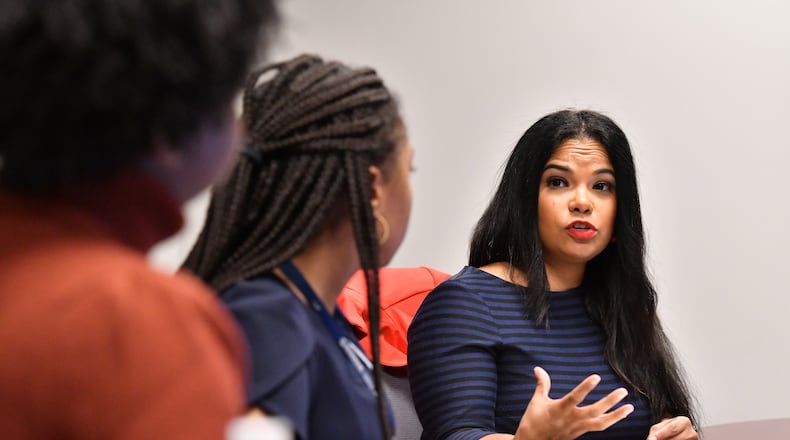The abrupt closure of Atlanta Medical Center in late October 2022 has forced a stunning surge of pregnant women to seek prenatal and delivery care at Grady Memorial Hospital, long the region’s safety-net hospital for poor, Black and medically vulnerable mothers and infants.
Grady’s Chief Medical Officer Robert Jansen said the sudden influx of mothers and newborns has far exceeded the numbers that Grady officials expected, stressing the staffs for maternity and infant care, including those in intensive care.
“Our deliveries are up about 30 percent or more over what they were previously,” Jansen explained. “So, that has a huge impact on the labor and delivery area.” He said his staff has recently seen an increase in women arriving by ambulance for obstetric care.
Numerous other pregnant women have turned to Emory University Midtown Hospital or are planning alternatives like home births. Piedmont Hospital, located in Buckhead about 6 miles northwest of AMC and Grady, has felt little effect, according to hospital spokesman John Manasso.
For years, Grady and AMC have cared for metro Atlanta’s poorest and sickest residents, most of them Black. That includes expectant mothers who have had little or no prenatal care, who are likely to be obese, malnourished, suffering with diabetes, high blood pressure and asthma — all conditions that alone or in combination contribute to maternal deaths, premature births and infant mortality — the deaths of babies.
Public health officials say Atlanta and the rest of Georgia have alarming rates of maternal and infant mortality. According to the Centers for Disease Control and Prevention, 769 Georgia infants died in 2020, or 6.28 infants out of every 1,000 births. In its 2022 report card on maternal and infant mortality, the March of Dimes recently reported that Black babies in Georgia died at a rate of 10.8 per 1,000 live births, more than twice the number for white babies at 4.9 per 1,000 and 5.4 per 1,000 for Hispanic babies.
Grim statistics show that pregnant Black women in Atlanta and throughout Georgia are more than twice as likely to die of pregnancy-related causes than white women. From 2018 to 2020, the state Department of Public Health said Black women throughout Georgia accounted for 48.6 pregnancy-related deaths per 100,000 live births, while the rate for white women was 22.7 per 100,000.
Grady’s Jansen said that Grady has been working to increase maternal-infant care capacity by refreshing rooms, creating new operating rooms and new labor and delivery rooms.
“Some of the women that were probably delivering at AMC did not get good prenatal care, which is not the fault of AMC. This is a problem in Atlanta and in this part of the town,” he said. “A lot of women don’t get adequate prenatal care.”
He said the increased maternity patient load has seriously strained Grady’s neonatal intensive care unit, where volume is up 30-40%. That unit cares for medically fragile babies, many born prematurely and needing specialized medical care.
Credit: Hyosub.Shin@ajc.com
Credit: Hyosub.Shin@ajc.com
“We really had to work hard to be able to staff both labor and delivery as well as neonatal ICU and other women’s services,” said Jansen.
The closing of Wellstar’s AMC has also sent maternity patients to Emory University Hospital Midtown for labor and delivery care, some of it emergency care, though not in numbers like Grady.
“At Emory University Hospital Midtown, we have seen a slight increase in volume in our labor and delivery unit since the Wellstar AMC closing,” said Janet Christenbury, director of media relations for Emory Healthcare. “Our obstetrics triage service, which is similar to an emergency room for patients who are pregnant, has also seen an increase in patients needing urgent care during their pregnancy.”
Christenbury said in an emailed statement to The Atlanta Journal-Constitution that Emory is in the process of recruiting and hiring more staff to help care for patients.
Georgia has for years been burdened with high rates of maternal and infant deaths, a serious backdrop for the closure of AMC even as state health officials brace for a report of new, worse statistics.
“Georgia just has serious challenges,” said Dr. Natalie Hernandez, executive director of the Center for Maternal Health Equity at Morehouse School of Medicine. “We’re like a lot of other states that just have this dearth of resources available for communities.”
In 2017, Sekesa Berry, founder and executive director of the Atlanta Doula Collective, was compelled to get involved when she learned how many Black women were likely to die in childbirth, compared to white women. Berry, a community midwife, saw the integration of more doulas into the community as a solution.
“Doulas stand in the gap. They’re perinatal professionals. They are like allied health workers,” she said. " They are in the gap of care between the obstetrician and the intervals of prenatal visits.”
Berry said that she receives countless calls from expectant Black mothers who are afraid to go to the hospital because they think they will die. For her, it is important to not only increase awareness around maternal health, but to also provide solutions.
“The simplest solution is that, yes, we need more doulas, but we also need more midwives. And we need to allow midwives to really work with low-risk, no-risk mothers, as they do in other parts of the world,” Berry explained.
Chanel Stryker-Boykin, a doula and community educator for childbirth and lactation, said AMC’s closure was a “major blow” to the birthing community and low-income families.
“There’s this certain stigma around families who receive Medicaid, that they are a certain demographic of person, and Atlanta Medical removed that stigma,” Stryker-Boykin said. “When you came in you were just a person, and whatever your wishes were for your birth, they helped you to obtain that goal.”
Stryker-Boykin, who is also the perinatal workforce development coordinator at Healthy Mothers, Healthy Babies Coalition of Georgia, said that at AMC, mothers were allowed to have water births regardless of insurance status. She said the hospital was doula-friendly, provider-friendly and a place where midwives could utilize the hospital’s birthing center with their clients, some of them emergency transfers from home or a birthing facility.
As a mother and doula, she also spoke from the perspective of a Black woman when she said that many people within the Black community have “iatrophobia”, fear of going to a doctor, because of the community’s history of maltreatment and exploitation from medical providers.
“You have the aspect of am I to be listened to, heard and respected, or am I going to be criminalized,” she said. “I know people want to feel like the low-income woman or the woman with Medicaid just doesn’t want to go to her prenatal appointments because she doesn’t care about her pregnancy, but no. It’s not that she doesn’t care about her pregnancy. There are a lot of factors.”
Doula and birthing advocate Celena Martin herself is pregnant and due in April. She had been leaning toward giving birth at AMC before it closed, but now she has opted for a midwife-assisted home birth.
“It’s harder for people that don’t have the education because that was the “aha” moment for me, realizing that this was even available,” she said. “Pregnancy, any big transition in life, can be scary.”
The Atlanta Journal-Constitution and Report for America are partnering to add more journalists to cover topics important to our community. Please help us fund this important work at ajc.com/give
About the Author
The Latest
Featured




